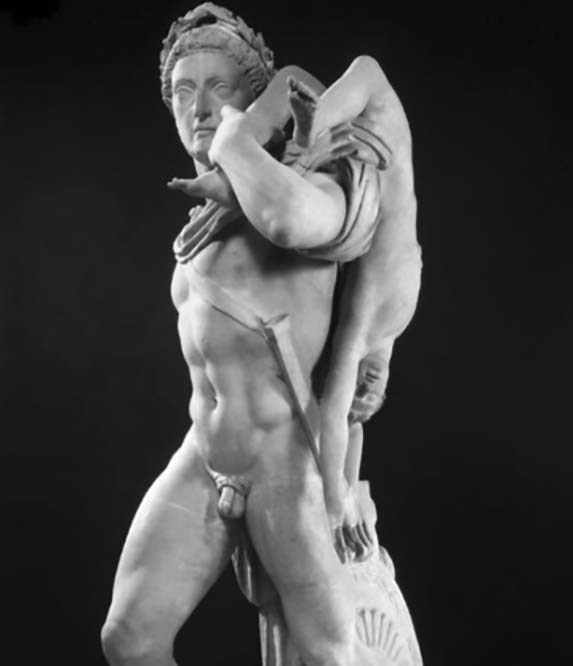Atreus
In Greek mythology, Atreus (Ancient Greek: Ἀτρεύς, from ἀ-, "no" and τρέω, "tremble"; meaning: "fearless") was a king of Mycenae. Atreus lost the throne of Mycenae when his wife betrayed him with his own brother. But when Zeus sent a portent, letting the sun set in the east, Atreus gained the throne.
Yet he, still craving revenge, used his power to commit even worse crimes, which led to his fall. Atreus was father of Agamemnon and Menelaus who, for being his sons, are called the Atrides.
Mycenaean background
Mycenae was first ruled by its founder Perseus. At his death or when he gained immortality, Perseus was succeeded in the throne by his son Electryon, and this one by his brother Sthenelus. But Electryon died when his son-in-law Amphitryon accidentally killed him, and therefore Sthenelus banished Amphitryon, seizing the throne of Mycenae and Tiryns.
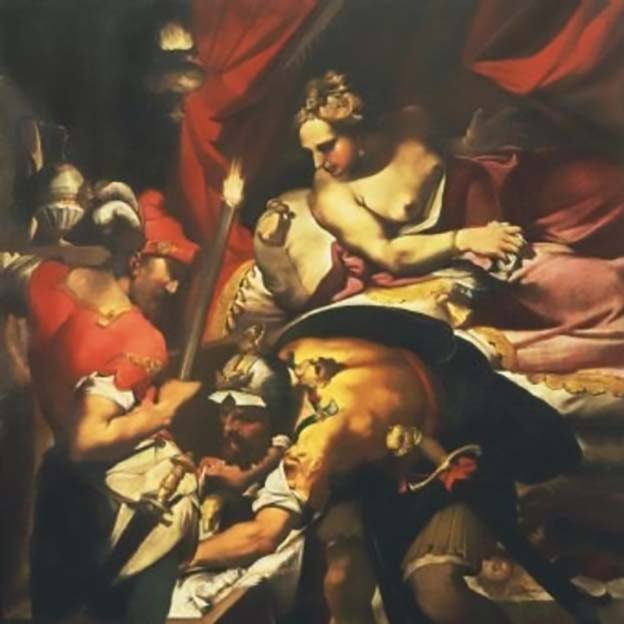
Hegemony of the Pelopides
Now both Amphitryon and his wife Alcmena were descendants of Perseus; so while they were in exile in Thebes, the throne of Mycenae, instead of being in possession of the Perseids (descendants of Perseus) came gradually under the rule of the Pelopides (descendants of Pelops).
For Sthenelus married Pelops's daughter Nicippe, and when he seized Mycenae, he also entrusted to Atreus and Thyestes the city of Midea, which is northeast of Argos. Sthenelus was succeeded by Eurystheus, known as the tormentor of Heracles.
Atreus inherits Eurystheus
Heracles, whose parents on earth were Amphitryon and Alcmena, performed his labours under Eurystheus' orders and in agreement with an oracle. But later Eurystheus, campaigning against the descendants of Heracles, was killed by Heracles's son Hyllus or by Iolaus, who was Heracles's nephew and charioteer.
Eurystheus' head, they say, was brought to Alcmena who gouged out the eyes with weaving-pins. In spite of this triumph obtained by the Perseids, now called Heraclides after Heracles, the throne of Mycenae did not revert to the descendants of Perseus before several generations had passed. For when Eurystheus left Mycenae in order to attack the Heraclides, he committed the government to Atreus, and after his death the Mycenaeans received, not surprisingly, an oracle which bade them choose one among the Pelopides for their king.
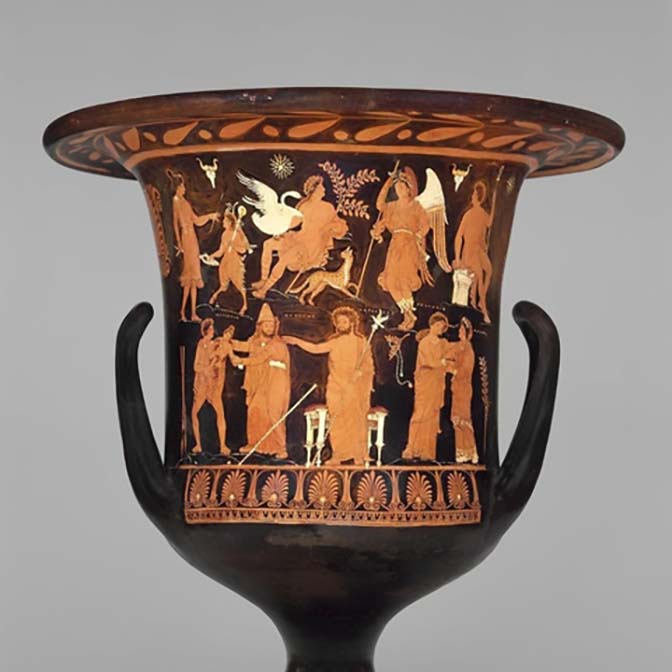
The Curse of Myrtilus
In this matter Atreus was challenged by his own brother Thyestes, who presented himself as candidate to the throne. These brothers were fated to be rivals and destroy one another, as the sons of Oedipus also did; for Hermes' son Myrtilus had long ago uttered terrible curses not only against his murderer Pelops but also against his whole house, so that the punishment for breaking an oath would fall also upon his descendants.
That is why Atreus destroyed most of Thyestes's descendants banishing his brother, and Aegisthus slew both Atreus and Agamemnon, and Orestes killed Aegisthus and his mistress Clytaemnestra, who was Orestes's own mother. And some drops of this blood were to pay for that of Myrtilus, whereas the remaining blood covered new debts, such as that concerning Iphigenia.
The murder of Chrysippus
Yet Atreus and Thyestes had not always been bloodthirsty, since they once had refused to kill their half-brother: While Oedipus' father Laius was still in exile, he lived in Peloponnesus, being hosted by Pelops. Laius, they say, fell in love with Pelops's bastard son Chryssipus, son of the Nymph Danais, and carried him off, being pursued and arrested by Atreus and Thyestes, legitimate sons of Pelops and Hippodamia.
But Laius obtained mercy from the king, since Pelops did not wish to punish a man on account of his love. But Queen Hippodamia plotted against bastard Chrysippus, and arguing that he would become a contestant for the throne, she tried to persuade Atreus and Thyestes to assassinate him. Since they refused, Hippodamia visited at night Laius and Chrysippus when they were asleep, and taking the sword of the Theban, she wounded Chrysippus and fixed the sword in his body, so that Laius would be suspected.
However, Chrysippus acknowledged the truth before dying, and King Pelops banished his wife, who, according to some, committed suicide after withdrawing to Midea in Argolis. But others say that Chrysippus was in fact murdered by Atreus and Thyestes, at the instigation of their mother.
Aerope, wife and mistress
Atreus married Aerope, daughter of Catreus, who ruled in Crete and whose funeral, years later, was most untimely. Aerope, they say, was given by her father to Nauplius (father of Palamedes) to be sold in foreign lands; and Nauplius brought her to Mycenae, where she married Atreus, becoming in addition the mistress of Thyestes.
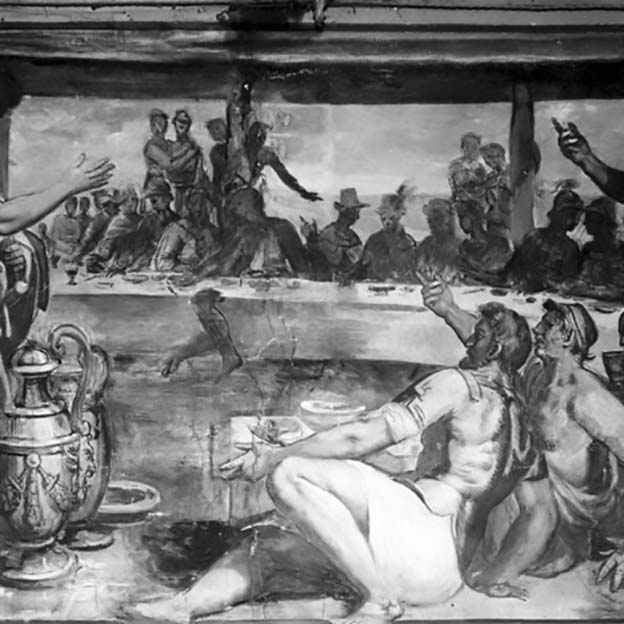
The golden lamb
It is now told that Atreus once had vowed to sacrifice to Artemis the finest of his flocks; but when a golden lamb appeared, he forgot everything about his vow and, after choking the lamb, he hid it inside a box. Some have said that it is on account of this broken promise that Artemis held the winds when the Achaean fleet, which was about to sail to Troy, had gathered in Aulis. But now Aerope gave the golden lamb to her lover Thyestes, who declared that the kingdom ought to belong to him who owned a golden lamb.
Atreus agreed to this, believing he still had the golden lamb locked and safe, but instead it was Thyestes who produced the lamb, becoming thereby king of Mycenae. After his death, Thyestes, who employed adultery as a means to gain the throne, was still associated with this marvellous ram; for it is told that there was a stone ram on his grave, a memorial recalling the way in which he had obtained the animal, that is, by debauching his brother's wife.
Zeus sends a portent
But Zeus, they say, sent Hermes to instruct Atreus to make a new agreement with Thyestes by which Atreus should be king if the sun should go backwards. And when Thyestes agreed to this impossibility, the sun set in the east; for nothing is impossible for the gods.
Concentrating in evil
The good news for Atreus were that he now was king; the bad news were that his wife was adulterous. Now Atreus was the kind of man who concentrates in what is evil and disregards what is good. Therefore, when he learned about his wife's infidelity, he plotted against his brother, inviting him to come to Mycenae. For the occasion he prepared a special dinner according to family tradition, that is, one resembling the dinner that his grandfather Tantalus had once offered to the gods.
This was his recipe: he slaughtered two or three of Thyestes's sons, and cutting them limb from limb, boiled them and served them up to Thyestes, except the extremities, which he showed to Thyestes once the latter had eaten what he thought to be a delicious meal. And when the infamous dinner was ended, he banished him again.
Boundless hate
This is what happened between these mighty brothers, who could have reigned jointly, living in confidence and affection, and instead gave themselves to boundless hate. But as Thyestes himself observed:
"Crime enters not lowly homes, and in safety is food taken at a slender board; poison is drunk from cups of gold." (Seneca, Thyestes 451).
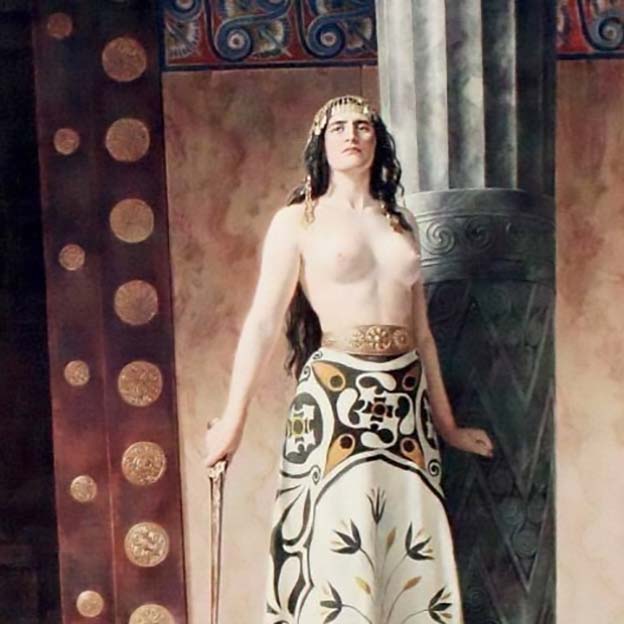
Theories and opinions
There are those who say that the sun did not change its course to let Atreus be crowned, but out of horror for his crime. And still others, thinking that people of ancient times were like children and not as clever as modern men, say that the whole story about the sun was just an eclipse.
And since there is often an eclipse at hand, they might like to refer to the one that took place in 1281 BC, in which the sun is said to have appeared already darkened over the horizon. And it has also been said that Atreus was appointed king for having discovered that the sun revolves in opposite direction to the movement of the stars.
But others, caring little for such theories, say that behind every story is Eros, and that had Aerope abstained from love for Thyestes, the sun had not changed its course. In any case, these are the reasons why Mycenae—being thus busy with adultery, betrayal, slaughter, cannibal banquets, and as they say, darkness from heaven—did not participate in the expedition of the Seven Against Thebes, which took place at this time on account of a similar feud between the sons of Oedipus.
Avenger conceived
In utter defeat, Thyestes visited then the Oracle of Delphi, asking how he could have vengeance on his brother, and the Oracle answered that he must lie with his daughter Pelopia and beget a son who would avenge him. Later, when Thyestes came to Sicyon, he found that they were sacrificing to Athena by night, and fearing to profane the rites, he hid in a grove.
Pelopia, who happened to lead the dancing groups during the sacrifice, slipped and stained her clothes with the blood of the slain victim; and when she went to a nearby stream to wash off the blood, she was raped by her own father who suddenly came out of the grove. But while he stole her virginity, she stole his sword. This is how the avenger Aegisthus was conceived, and his weapon preserved.
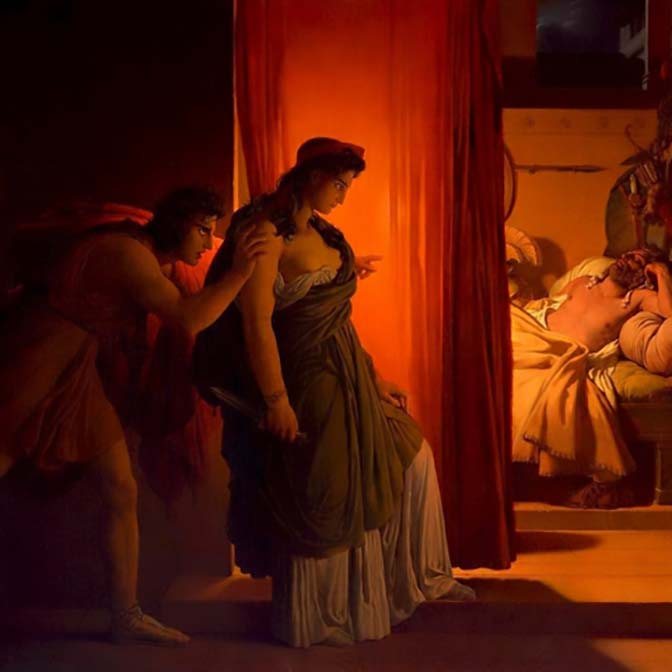
Avenger grows
In the meantime, misery had come to Mycenae because of the crimes of Atreus, or so they believed; for someone must be found responsible when calamities occur. The Oracle was then consulted regarding the barrenness of the land, and it prescribed that Thyestes should be recalled to the city.
Atreus then, following the Oracle's instructions, came to the court of King Thesprotus, hoping to find his brother there. Thyestes was away, but Atreus, having met Pelopia in the court, and believing that she was Thesprotus's daughter, asked the king that she be given to him in marriage. The king granted Atreus' wish, and the avenger Aegisthus, still in the womb, was brought to Mycenae by his future victim, who raised him as his own son.
Family reunion
Years passed and Atreus, who was still looking for his brother, sent his sons Agamemnon and Menelaus to inquire about Thyestes at Delphi. There they met, by chance, their uncle, who still asked the Oracle about taking vengeance on his brother. Having seized him, they brought him to Mycenae and cast him into prison. Having thus recalled Thyestes to Mycenae as the Oracle had ordained, Atreus bade Aegisthus, whom he believed to be his third son, to kill Thyestes in his confinement.
Aegisthus then came to the prison to carry out Atreus' request, but he appeared in front of the prisoner wearing the sword that Thyestes had lost when he ravished his own daughter Pelopia. And when Thyestes asked him where he had got it, Aegisthus replied that his mother Pelopia had given it to him.
They then summoned Pelopia, who declared that she had stolen it from the unknown man who had raped her by night, the same who was Aegisthus' father. This is how father and son learned who they were, but Pelopia, realising who the father of her son was, snatched the sword and plunged it in her breast.
Death of Atreus
After this bizarre family reunion, Aegisthus, bore the bloody sword to Atreus as an evidence of Thyestes's death; and later, while Atreus was sacrificing on the shore, Aegisthus slew him and restored his father to the throne, forcing Agamemnon and Menelaus to go into exile to the court of King Polyphides of Sicyon.
But the Atrides returned after some years, Agamemnon reigning in Mycenae and Menelaus in Sparta, and Atreus was buried in Mycenae, along with the treasures that he and his children stored in underground chambers.

Sources
Bibliotheca, Epitome II, 10-16;
Burkert, Walter (1972), Homo Necans pp. 103–108
Euripides, Electra.
"Plato, The Statesman". Classics.mit.edu. Retrieved 2013-02-04.
Bryce, Trevor R., 'The Trojan War: Is There Truth behind the Legend?', Near Eastern Archaeology, Vol. 65, No. 3. (Sep. 2002), p. 193.
R. S. P. Beekes, Etymological Dictionary of Greek, Brill, 2009, p. 158.
M. L. West, "Atreus and Attarissiyas", Glotta, vol. 77 (2004), pp. 262–266. He suggests that Atreus is a secondary form based on the patronymic Atreïdēs, which is in turn derived from the Mycenaean *Atrehiās.
Herbert, Frank (2019). God Emperor of Dune (Ace premium ed.). New York, NY: ACE/Berkley. p. 17.
"Greek Mythology Link"


